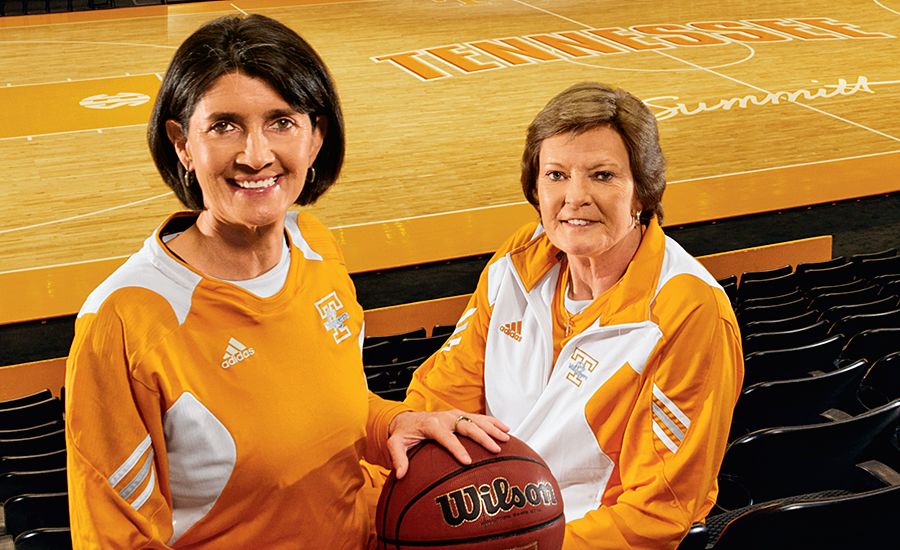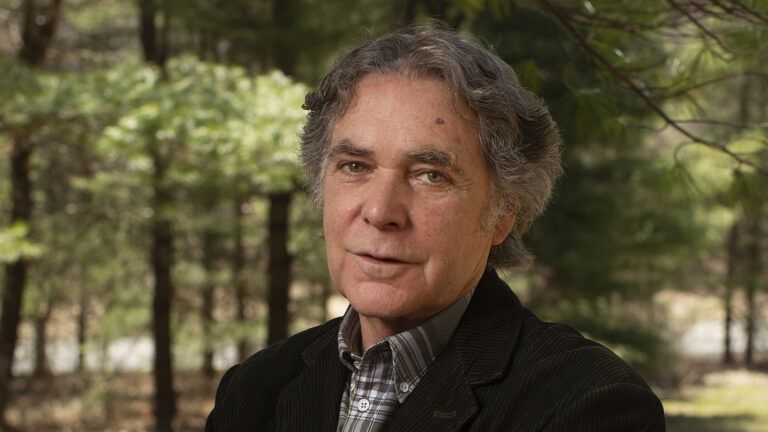We were sorry to learn of the passing on June 28, 2016, of Pat Summitt, legendary head coach of the University of Tennessee’s Lady Volunteers basketball team. As a tribute, we offer this 2012 story from one of Summitt’s longtime assistant coaches, Mickie DeMoss:
The phone call came out of the blue one spring day in 2010. I wasn’t surprised to hear from Pat Summitt, the legendary University of Tennessee women’s basketball coach and my mentor.
I’d been one of her assistants for 18 years. We’d worked together until 2003, coaching the Lady Volunteers to six NCAA titles, and we were still good friends. But I was surprised to hear Pat say, “I want you to come back to Tennessee.”
Why now? I’d been away for seven years. When I’d left to run the University of Kentucky women’s basketball program, no one had been more thrilled for me than Pat. And she knew I was happy in my current job as an assistant coach at Texas.
READ MORE: ALZHEIMER’S CAREGIVER LEARNS NEW WAY TO LOVE
“Come on, Mickie,” Pat said. “Let’s finish out our careers together.”
I couldn’t put my finger on why, but there was something beyond the usual insistence in her voice. It was like having my sister say, “Come home. I need you.”
So I didn’t hesitate. But in the back of my mind I thought, When had Pat ever needed help? She was the toughest, strongest, most capable person I knew. She was the one I leaned on when I went through the hardest struggle in my life—my mother’s long struggle with dementia.
Pat came with me on visits home to Mom in Louisiana. She gave the eulogy at Mom’s memorial service. Pat did so much for me that I sometimes wondered, Lord, how can I repay her? Please don’t ever let me let her down.
The day I arrived back in Knoxville, I drove straight to Pat’s. She said I could stay with her till I found my own place. True to form, she filled me in on the team right away. But she seemed oddly distracted and after 10 minutes, she stood abruptly and left the room.
She probably had a million things going on, too much even for a champion multitasker like her to keep up with. Maybe that was why she asked me to come back.
One night not long after that, Michelle Marciniak, a star point guard for the Lady Vols in the mid-1990s, called and said she’d be in Knoxville the next day. Could she stay at Pat’s? “Sure,” I heard Pat say. “It’ll be great to see you.”
The next morning at breakfast I mentioned I was looking forward to catching up with Michelle. “She’s coming today?” Pat said. “I didn’t know that.”
READ MORE: AN INSPIRING HOOPS HERO
“She called last night, around ten,” I reminded her.
“I remember now,” Pat said. But I could tell by her expression she didn’t.
Pat was notorious for being so focused on her work that she’d forget where she put her keys or parked the car. All of us assistants teased her about it. But forget even the smallest detail about one of her players? That wasn’t the Pat I knew.
I felt a flicker of unease. This was how things had started with my mom, these little lapses. Pat’s just overworked, I told myself. Mom was in her late seventies when she showed symptoms of dementia. Pat was only 57. Way too young for Alzheimer’s.
When we first met, back in the early 1980s, Pat was already like Wonder Woman. She had this aura about her. People were drawn to her, both players and coaches.
She taught us to believe not just in her and in the team and the program she’d built from scratch at Tennessee but also in ourselves, which was probably the even bigger challenge.
That didn’t mean she wasn’t tough on us. If you follow women’s college basketball at all, you’ve seen the stare. That laser-like look that could burn holes in the hardwood. Its message was clear: I expect more from you. A heck of a lot more!
If a player or assistant didn’t live up to her standards, she didn’t hesitate to deploy the stare and call us out. It didn’t matter if it was a passing drill we ran every day at practice or the nervewracking final seconds of the NCAA championship game, Pat demanded that everyone give their all at all times.
She asked no less of herself, and let me tell you, that was powerful. When you see your role model put her heart and soul into her work, you try your best to do the same.
READ MORE: CARING FOR B. SMITH
Pat cared deeply about us off the court too. When I left to become the head coach at Kentucky, she promised she’d always be there for me. Boy, did I test that promise my first year at UK. I must’ve called Pat three times a week.
I’d inherited a last-place team and it seemed like we lost more games in a month than we had in all my years with the Lady Vols. Nothing I tried worked. My patience with my players got shorter.
One night after we’d blown yet another game, I called Pat to vent. “I’ve been tough on these kids, made them practice harder, but we’re still not winning. I’m not getting anywhere with this team!”
She let me talk myself out. Then she said, “Look, Mickie, one of your great gifts is your personality. If you’re focused on being tough, your team won’t see your best side. Let the kids know you. Care about them as much as you care about winning. Then they’ll play hard for you.”
I took Pat’s advice and eased up a little at practice, let more of the real me show. Guess what? Over the next few weeks, the team loosened up and we won a game. Then another. My last two years at Kentucky we had back-to-back 20-win seasons.
I had to thank Pat—she’d always been good about giving her assistants responsibility, preparing us for the next step in our careers.
READ MORE: KIM CAMPBELL ON ALZHEIMER’S AND FAITH
Then came that 2010-2011 season, my first back at Tennessee. Pat seemed to be pulling back more than usual and letting the other assistant coaches, Holly Warlick and Dean Lockwood, and me take charge.
There were more of those little blips. Pat would hesitate calling a play or forget what time we’d scheduled a meeting. The change in Pat probably struck me more than it did Holly and Dean since I’d been away for so long. They’d been working side by side with her, and a slow erosion is less obvious when you’re with someone day to day.
We sensed something was wrong, but we didn’t talk about it. Out of respect for Pat. And maybe even more to protect ourselves. It shakes up your whole world when the person who’s always been your rock starts to crumble.
Typically it was Pat who faced her problem first. One day last April I was going to see my family in Louisiana. “I’ll drive you to the airport,” Pat said. We got on the highway and she started right in. “I just got back from the Mayo Clinic. They confirmed I have early onset dementia.”
She glanced at me and tried to gather herself but couldn’t. She got emotional. So did I. Mom’s decline was one thing; she’d lived a long full life by then. But Pat! She was in her prime. Lord, I wondered, how can this be happening to her? I could hardly bear to ask. “What are you going to do?”
“The doctors told me I can still coach if I want to,” she said. “And I do.”
My two biggest role models—my mom and Pat. What were the chances that they’d both be stricken with dementia? I didn’t understand Mom’s disease at first. I got impatient at having to repeat myself and frustrated by her unpredictable moods.
I’d go see her between games and recruiting visits, but my sister, who lived near Mom, was the one with her day to day. She got me to understand that we had no control over Mom’s mental state. I had to learn to take things not one day but one moment at a time.
Lord, is this how I can help Pat? I asked. Show me what to do for her.
That summer Pat redistributed some of her duties among Holly, Dean and me, especially in-game coaching and recruiting. She went on medication to manage her symptoms and loaded up her iPad with crossword puzzles, Sudoku, all kinds of brain games.
In August, she told us, “It’s time our players knew.” She called a team meeting in the film room at the basketball complex. She stood up in front of us, like she had in a thousand meetings, and announced, “I’ve been diagnosed with early onset dementia, Alzheimer’s type.”
Stunned silence.
Pat’s face was fierce, determined. “I wanted all of you to know,” she said. “I also want you to know it will not change the way we work in practice, or play as a team. I’m not going to forget your names. And I’m not going to stop yelling at you. I’ll be your coach as long as the Good Lord is willing.”
Our players broke down. Me too. I tried to hide my tears, but you can’t slip anything by Pat. “DeMoss,” she said, “we’re not having a pity party for me.”
READ MORE: BIBLE VERSES FOR ALZHEIMER’S CAREGIVERS
Then it hit me. Pat taught me everything I knew about coaching, and she was teaching me still. Showing me that with clear-eyed honesty, courage, faith and a little humor, we would face this like any other challenge and carry on.
This past season Pat set the tone for the Lady Volunteers. She still burned to win, still turned that famous stare on us, but I noticed she had a lighter touch with players. She’d talk to them one-on-one if they needed motivation instead of calling them out in front of everyone.
She still loves having people over to her house. She invited us coaches to dinner not long ago, and cooked up steaks and chicken, asparagus and squash, and some jalapeño corn. She jokes around more than she used to and stays positive.
One day I left my cell phone down on the court. She brought it to my office. “Look what I found,” Pat said. “And I thought I was the one with dementia.” I had to laugh at that.
I’m taking my cues from her, day by day, moment by moment, like I did with my mom. You know, I don’t think there are a lot of coincidences. I believe I was meant to be back with Pat for this time in her life, being there for her the way she’s always been there for me.
Did you enjoy this story? Subscribe to Guideposts magazine.






